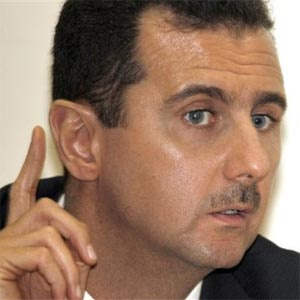The Last Call for Syria

 IRD: The strong-handed manner in which Bashar Assad has dealt with the pro-democracy uprising in his country may have come as a surprise to those knowing the background of the Syrian President. They expected the young Assad, having been educated in Britain, would be more aware of the interconnected world, and would make preemptive decisions to prevent the demonstrations in Syria from spiraling into its current gory situation. But Bashar proved not to be a wise ruler, rather, a failure.
IRD: The strong-handed manner in which Bashar Assad has dealt with the pro-democracy uprising in his country may have come as a surprise to those knowing the background of the Syrian President. They expected the young Assad, having been educated in Britain, would be more aware of the interconnected world, and would make preemptive decisions to prevent the demonstrations in Syria from spiraling into its current gory situation. But Bashar proved not to be a wise ruler, rather, a failure.His decisions throughout recent weeks are too little, too late. General amnesty for political prisoners or lifting the state of emergency could have been a deft move, but at the outbreak of the demonstrations, not when hundreds have been murdered and tortured. And at any rate, it is a matter of doubt whether a general amnesty is what can soothe the protestors. Many of the political prisoners have been actually charged with false criminal offenses, and are therefore not even eligible for the pardon, and in the meantime, what many citizens want is a stop to the bloodshed and massacres happening on the streets; not necessarily the release of prisoners.
The government has its own claims: that its military forces have been target of shootings and soldiers have been murdered, though the opposition claims that those killed in the army have been soldiers defying the orders to shoot at the people. The Syrian regime also likes to remind Syrians of the threat by its enemies. While it is true that Israel and the US are not fond of the Assads, this is a thin argument if it is meant to justify the brutal oppression of the people.
The proceedings in Syria have raised concerns also among its neighbors. Apart from longtime allies Iran and Hezbollah (whose leader Sayyid Hassan Nasrullah supported and exonerated Bashar Assad from the violence, which met with an angry reaction by the Syrian protestors), Turkey is also eyeing the developments warily. Ankara tried to take the middle approach at the outset of the demonstrations, advising Syria to show moderation in dealing with the protestors and to agree to the demands of the protestors; in particular the Sunni majority who sense a lack of freedom in a political system dominated by Alawites. Nonetheless, Damascus embarrassed Ankara by sticking to the iron-fisted policy. Turkey has gradually shied away from Syria, evident in the decrease in the level of economic exchanges and the Turks allowing Syrian opposition groups to hold a meeting in Anatalia, southern Turkey.
Syria should be thankful that it has not faced UN sanctions yet, thanks to its supporters China and Russia who have blocked EU and US efforts to pass a resolution against Bashar Assad’s regime. Nevertheless, Russian President Dmitri Medvedev has recently demanded that Syria realize the promises it has made. These remarks, besides continuous pressure by the EU and Washington, should be the final warning for Damascus to start substantial reforms as soon as possible before the international community comes to the conclusion that it is time for Assad to go.
* Mohammad Shari’ati Dehaqan is the former cultural attaché at Iran's embassy in Syria.

